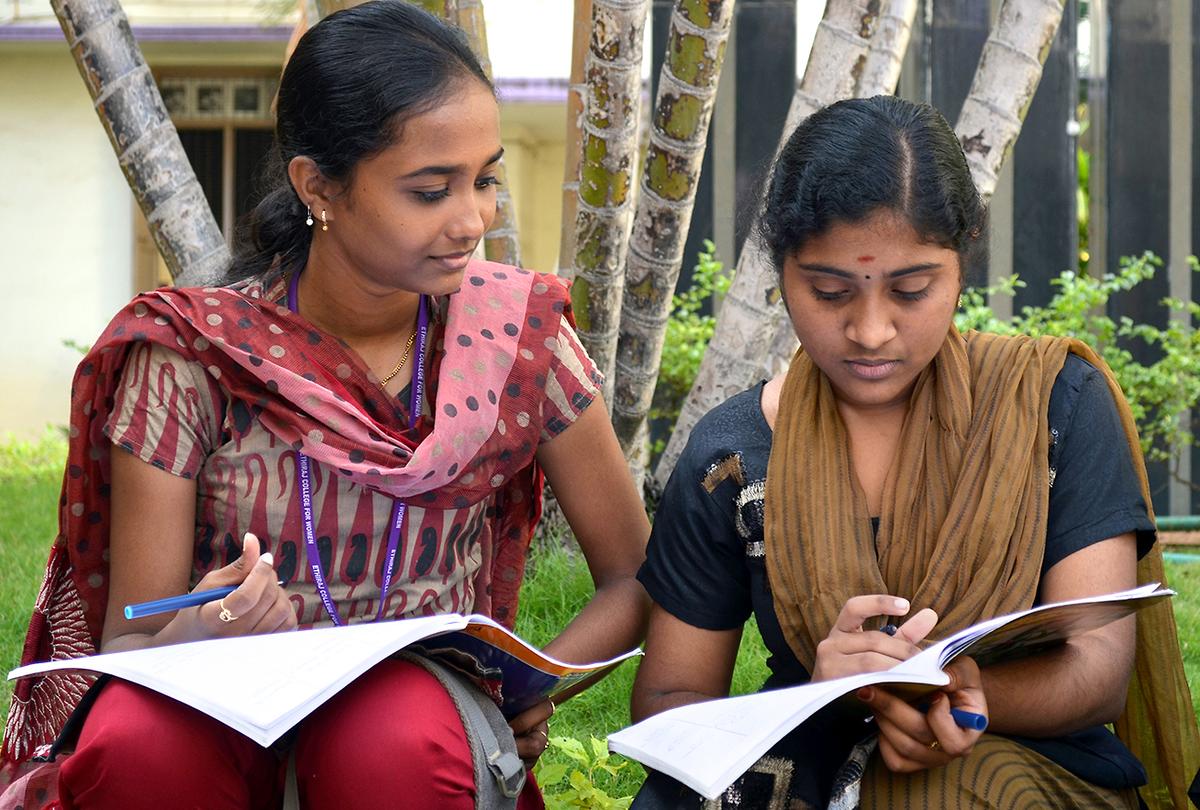Two school friends, Anjana and Priya, had their end term exams approaching. Both had similar academic goals, but their study approach and motivation levels differed significantly.
Anjana was focused and determined to do well in the exams. Priya, on the other hand, struggled to stay focused. One day, Anjana sat down with Priya during the break time in class. Anjana said she felt confident and relieved to have been able to cover the syllabus. Hearing this, Priya felt diffident and told Anjana how she feels overwhelmed about the vastness of the subject. She also said with the little time left for the exams, she wouldn’t be able to finish the studies. Anjana assured her not to worry and said she would help Priya to navigate her studies. The next day, Priya sought the help of Anjana to break down study material into manageable chunks and create a schedule that works for her. Anjana suggested to Priya to comprehend the study materials without memorising, take breaks in between, and revisit the chapters to see the progress in learning.
Soon, Priya felt motivated and realised the value of preparing a study schedule to make the learning experience a lot more easier.
Subsequently, Priya and Anjana fared well in the exams.
Representational image.
| Photo Credit:
File photo: THULASI KAKKAT
Friendships are not just about sharing a common interest; they can stand as a pillar of strength to help and motivate us in life. Friendships can also give us a balanced view of diverse viewpoints, opinions that can challenge your perception and introduce you to new ways of thinking. Surprisingly, the power of peer influence can have a profound impact in our lives. A study published in the journal Developmental Science mentioned the impact of social influence on the reporting of prosocial behaviour. The conclusion was that children and teenagers were susceptible to peer influence. The reason being their brains are perceptive to social situations, which affect the choices they make.
Encouraging positive peer influence
Adolescents are at a stage where if they get good company, they develop a sense of confidence and may even be encouraged to do well in school academically, taking part in extracurricular activities or trying out new activities they have not taken up before. Not to mention, this is also the time when teenagers are comfortable sharing their experiences and feelings with their circle of friends belonging to the same age group. Thriving in a meaningful friendship can also foster healthier habits in them – and influence others to do the same. According to the Centers for Disease Control and Prevention, people thriving in meaningful friendships have a 50% higher chance of survival than those with fewer social connections!
Abinaya, a student athlete from SDNB Vaishnav College in Chennai, shares a heartwarming experience of how her friend stood with her during obstacles. “ I am one of the top five athletes in Tamil Nadu. During my school days, I used to win medals in sports day events. This encouraged me to pursue sports professionally,” she says. But Abinaya encountered failure for the first time during a sporting event in class 8 when a girl named Shakthinee, her batchmate, won the race.

Representational image.
| Photo Credit:
File photo: NIVEDHA SEKAR
“Soon, we started training together, and slowly, my jealousy disappeared,” Abinaya adds. “Shakthinee stood by me as a well-wisher when I started to work to improve my abilities. We had started becoming friends. We started supporting each other in improving our performance on the field. We also helped each other catch up with academics. But our friendship did not stop us from competing and challenging each other in races. Even today, she is my well-wisher,” Abhinaya smiles with warmth.
Impacting EQ during teenage years
There is no denying the fact that friendship plays a crucial role in the formative years of a child. So, how does it impact the emotional quotient of an individual? Deepti Chandy, Therapist & COO, Anna Chandy & Associates, explains that friends are often the first space where individuals feel comfortable sharing without a filter, allowing them to truly be themselves. “Friends understand each other’s wavelength, and this mutual understanding becomes vital during adolescence — a phase marked by significant hormonal changes and emotional upheaval,” she said. “In fact, statistics show that mental health disorders often begin to show up around the age of 14. Hence, during this time, peer support, recognition, and help become essential. Friends become the go-to people for validation and comfort, making them a key influence on a teen’s emotional well-being and personality development, thereby establishing and maintaining a reliable friendship,” she adds.

“Friends understand each other’s wavelength, and this mutual understanding becomes vital during adolescence”Deepti ChandyTherapist & COO, Anna Chandy & Associates
Fostering collaborative learning
Studies have shown that reliable friendships can have a positive impact on the academic performance of students by fostering emotional support and reducing stress. Peer connections have often translated to collaborative learning and exchange of academic ideas, improving the concentration and learning retention among students, ultimately securing good GPA (Grade Point Average) scores. For instance, combined study sessions with friends have proven to yield better results than those who studied alone. A study conducted by the University of South Australia in 2014 indicated that 23% of university students studied better when learning with a buddy.
Nivedita, a visual communication student from Kerala, says that she and her friends always conduct group calls where one teaches and others note it down. “ We have this tradition of teaching each other what we are good at. Since my friend Aruna has a better understanding of Adobe software, she helps me and others to solve our queries. I am proud to say we have done extremely well for our practical exams.”
Warning signs to recheck your peer group
a. Do you feel forced into doing something?
b. Do you feel uncomfortable with your actions?
c. Are your actions something you feel ashamed of or try to hide?
If the answer is yes to any of these, it might be worth reflecting on the kind of influence your peers have on you.
Peer quality over quantity
As much as we encourage positive peer influence, it has its own share of demerits. Negative peer influence can make you do something you wouldn’t do otherwise. This is because you want validation from your peers. “ There’s a popular saying: You are the five people you hang around with. If you think about it, the way we speak, the phrases we use, our movie choices, food preferences — all of these are unconsciously influenced by the people around us. So being surrounded by quality individuals—people who help us grow — is incredibly beneficial. Especially during adolescence, peer pressure can be intense,” says Deepti.
“It becomes important to have peers who encourage the right values and support us with healthy perspectives while we navigate these experiences. Additionally, it’s worth noting that while only 25% of teens today spend time with their peers in person, over 55% text their friends daily, according to the Pew Research Center. This shift shows how digital communication plays a significant role in friendships and peer influence, making the quality of those interactions even more important,” she concludes.
Published – August 03, 2025 03:20 pm IST
